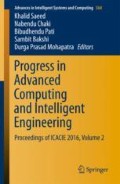Abstract
The application proposed in this paper provides an environment for physical interaction with three-dimensional models in the digital world. The main focus of the project is to introduce education to learners using modern technologies like computers and video games. An educational game is introduced, wherein the basic idea of electric charge and force has been developed. The interaction is made more physical by using a low-cost interactive device called Wii-remote which is basically a remote for a gaming console. The application effectively makes use of the motion-sensing capability of Wii-remote, thus exploiting it as an educational tool.
References
Papastergiou, Marina: Digital game-based learning in high school computer science education: impact on educational effectiveness and student motivation. Comput. Educ. 52(1), 1–12 (2009)
Shih, K., Squire, K., Lau, R.: Guest editorial: special section on game-based learning. IEEE Trans. Learn. Technol. 3(4), 278–280 (2010)
Quing, L., Tay, R., Louis, R.: Designing digital games to teach road safety: a study of graduate students’ experience. Loading 6(9) (2012)
Virvou, M., Katsionis, G., Manos, K.: Combining software games with education:evaluation of its educational effectiveness. Educ. Technol. Soc. 3(4), 307–318 (2005)
Annetta, L.: The “I’s” have it: a framework for serious educational game design. Rev. Gen. Psychol., 105–112 (2010)
Durkin, k.: Video games and young people with developmental disorders. Rev. Gen. Psychol., 122–140 (2010)
Barah, S., et al.: Making learning fun: Quest Atlantis, a game without guns. Educ. Technol. Soc. 53, 86–107 (2005)
Jong, M., et al.: An evaluative study on VISOLE—virtual interactive student-oriented learning environment. IEEE Trans. Learn. Technol. 3, 307–318 (2010)
Bryant, J., Akerman, A., Drell, J.: Wee Wii: preschoolers and motion-based game play. Annual meeting of the International Communication Association, Montreal, Quebec, Canada (2008)
Ho, J.H., et al.: Investigating the effects of educational game with Wii remote on outcomes of learning. Transactions on Edutainment III, pp. 240–252. Springer Berlin Heidelberg (2009)
Hwang, J.Y., Yi-Luen, E.: WiiInteract: designing immersive and interactive application with a Wii remote controller. In: 15th International Conference on Computer Games. AI, Animation, Mobile, Interactive Multimedia, Educational & Serious Games, July 28–31
Holmquist, L.E., Ju, W., Jonsson, M., Tholander, J., Ahmet, Z., Sumon, S.I., Acholonu, U., Wingrad, T.: Wii sciene:teaching the laws of nature with physically engaging video game technologies, Stanford University
Declaration
Authors have obtained all ethical approvals from appropriate ethical committee and approval from the students or from their parents/LAR (because the students are minor) who participated in this study.
Author information
Authors and Affiliations
Corresponding author
Editor information
Editors and Affiliations
Rights and permissions
Copyright information
© 2018 Springer Nature Singapore Pte Ltd.
About this paper
Cite this paper
Deb, S., Sinha, M., Nandi, S., Bhattacharya, P. (2018). Blended 3D Interaction Using Wii-Remote for Learning Educational Content. In: Saeed, K., Chaki, N., Pati, B., Bakshi, S., Mohapatra, D. (eds) Progress in Advanced Computing and Intelligent Engineering. Advances in Intelligent Systems and Computing, vol 564. Springer, Singapore. https://doi.org/10.1007/978-981-10-6875-1_3
Download citation
DOI: https://doi.org/10.1007/978-981-10-6875-1_3
Published:
Publisher Name: Springer, Singapore
Print ISBN: 978-981-10-6874-4
Online ISBN: 978-981-10-6875-1
eBook Packages: EngineeringEngineering (R0)

